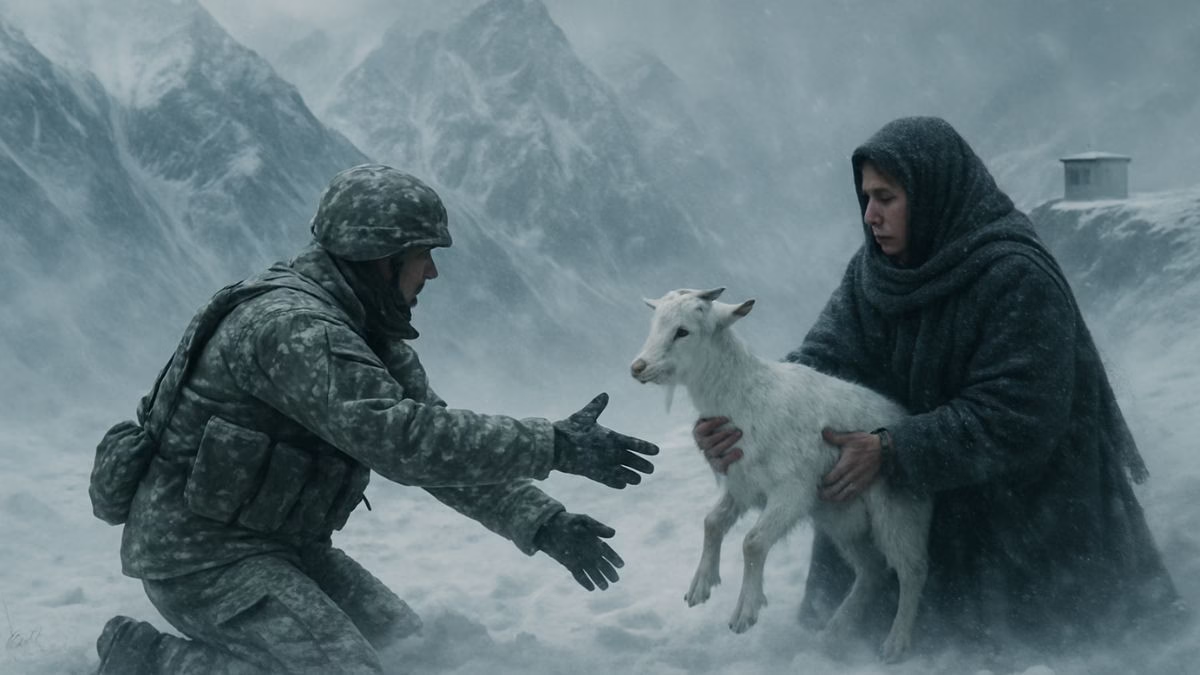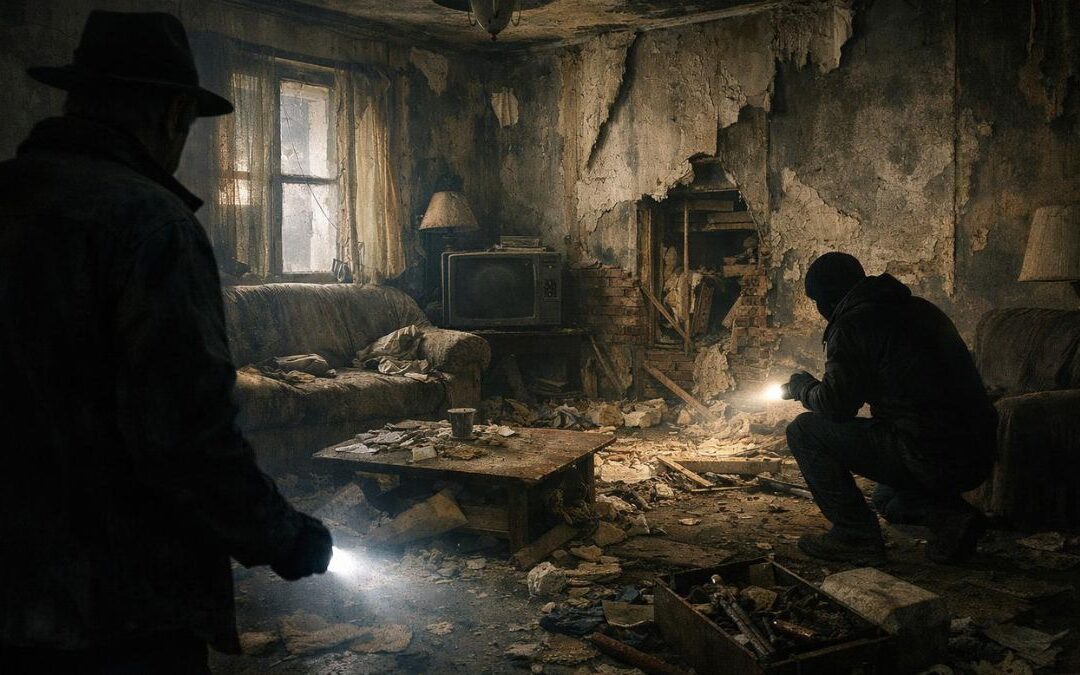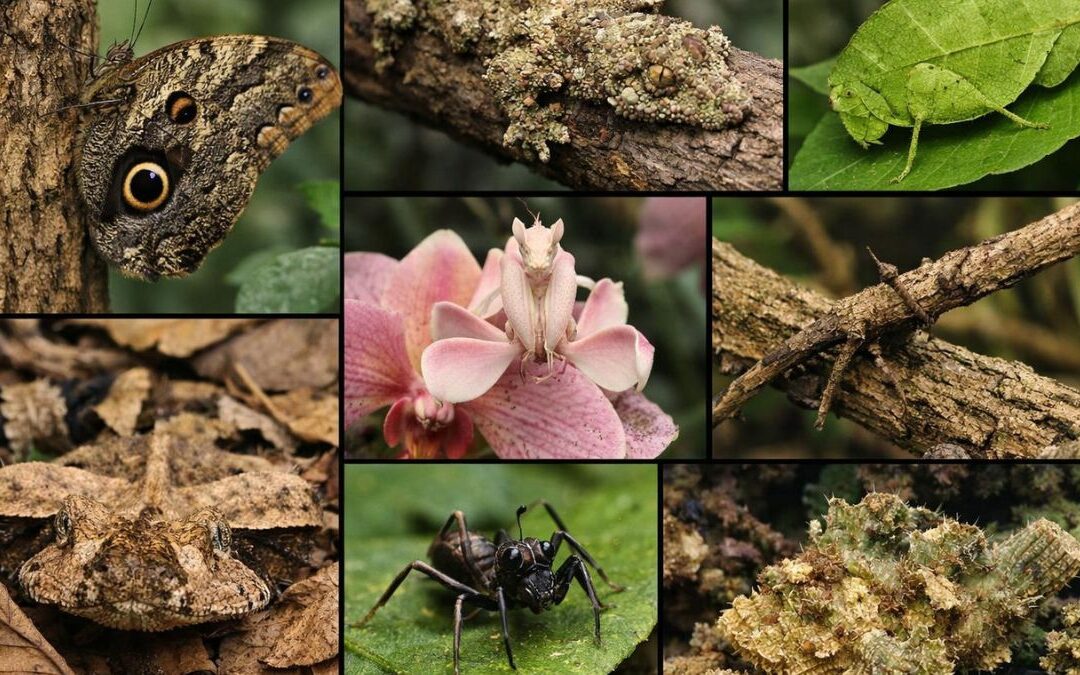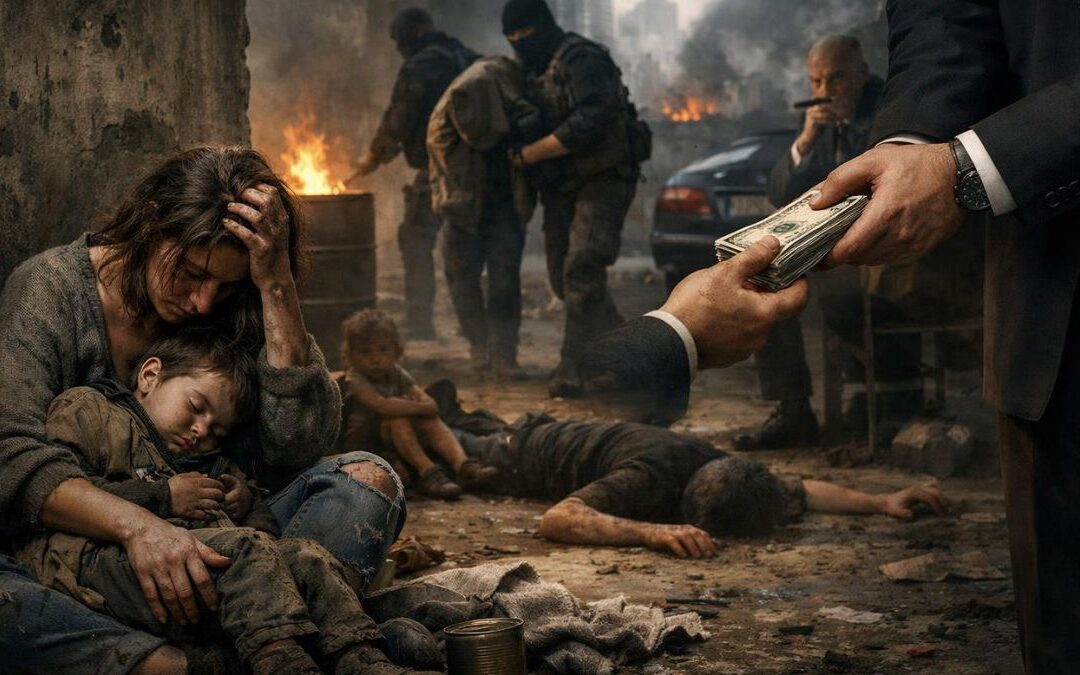The wind in the Caucasus Mountains did not howl; it screamed. It tore through the jagged peaks of the borderlands, whipping up clouds of ice crystals that stung exposed skin like needles.
Levan adjusted the strap of his rifle, shifting his weight from one frozen boot to the other. He was standing inside a small, concrete guard post, a lonely gray box perched on the edge of a cliff. Below him lay the gorge—No Man’s Land. A stretch of snow and rock that belonged to no one, a silent void separating his country from the one across the ridge.
It was Christmas Eve, though it didn’t feel like it. There were no lights here, no supra feasts with wine and khinkali, no polyphonic singing echoing off the walls. There was only the white static of the snow and the heavy, suffocating silence of a frozen ceasefire.
Levan raised his binoculars, scanning the opposite slope. It was a routine he performed every ten minutes, a ritual of paranoia and duty. Usually, he saw nothing but rock and the occasional wolf.
But today, he saw movement.
His heart kicked against his ribs. He dropped the binoculars and raised his rifle, clicking the safety off. His finger hovered over the trigger as he peered through the scope.
A figure was moving in the neutral zone. Not a soldier in camouflage, crawling with intent. It was a woman.
She was wrapped in layers of dark wool, a colorful scarf tied tightly around her head. She was stumbling through the hip-deep snow, her arms waving frantically. She wasn’t looking at Levan’s post; she was looking at a patch of scrub brush further down the slope.
Levan squinted. There, tangled in the thorns of a wild blackberry bush, was a goat. It was bleating in distress, its white coat blending into the snow, but its struggle was violent.
The woman fell, scrambling back up, desperate. Levan lowered the rifle slowly. He knew what a goat meant in these mountain villages. It wasn’t just a pet. It was milk. It was cheese. It was survival through the long, brutal winter. If she lost it, her family might not eat.
He looked at the opposing ridge. No movement. The soldiers on the other side were either asleep or warming themselves by a stove, blind to the drama unfolding below.
Levan looked back at the woman. She was exhausted, her movements slowing. The snow was winning.
Duty says I fire a warning shot, Levan thought. Duty says I force her back.
But the wind carried a faint sound—her voice, sharp and pleading, calling out to the animal. It was a sound of desperation that needed no translation.
Levan cursed softly. He slung his rifle over his shoulder, muzzle down, and stepped out of the concrete box.
He slid down the embankment, his boots carving deep furrows in the snow. The woman froze when she saw him. She stopped moving, her eyes wide with terror, fixing on the uniform, the patch on his shoulder, the weapon on his back.
Levan didn’t speak. He couldn’t. They didn’t share a language, and words here were dangerous things. Instead, he held his hands up, palms open. I am not here to fight.
He pointed at the goat, then at himself, and made a pulling motion.
The woman hesitated, her breath coming in sharp, white puffs. Then, slowly, she nodded.
Levan moved past her, the snow reaching his thighs. He reached the bush. The goat was panicked, its leg twisted in the thorns. Levan grabbed the animal by the horns to steady it, ignoring its thrashing. He pulled a knife from his belt—the woman gasped—but he only used it to slash the thick vines trapping the animal’s leg.
“Easy,” he muttered, more to himself than the goat.
With a final tug, the animal was free. Levan scooped it up—it was heavier than it looked, dense with winter muscle—and turned back. He trudged up the slope to where the woman stood and placed the shivering animal in her arms.
She buried her face in the goat’s fur for a second, then looked up at Levan. Her face was lined with windburn and age, her eyes dark and intelligent. The fear was gone, replaced by a profound, silent relief.
Levan reached for his belt again. This time, he unclipped his canteen. He unscrewed the cap and offered it to her.
She stared at it, then at him. It was a small thing, a breach of protocol, a risk. But she took it. She took a long drink, the water spilling slightly over her chin, and handed it back.
Levan took a drink from the same rim. The water was freezing, but it burned going down, waking him up.
They stood there for a moment in the howling wind, two enemies on a patch of land that belonged to neither of them, united by a goat and a drink of water. There were no treaties signed, no flags waved. Just the simple, profound decision to lay down the hostility for the sake of a life.
The woman reached into her pocket and pulled out a handful of dried apricots. She pressed them into Levan’s gloved hand.
He nodded, a short, sharp dip of his chin. Thank you.
She turned and began the trek back to her side of the ridge, the goat held tight against her chest. Levan watched her until she disappeared over the crest.
He looked down at the dried fruit in his hand. He popped one into his mouth. It was sweet, tasting of summer sun, a stark contrast to the frozen world around him.
Levan climbed back to his post. He picked up his binoculars and resumed his watch. The wind still screamed, and the cold still bit, but as he stood there, watching the empty snow, the rifle on his shoulder felt a little lighter. He was a soldier, yes. But for ten minutes on Christmas Eve, he had just been a man helping a neighbor. And that, he decided, was enough.
A Prayer for the Lines We Draw
Let us speak now to the wind that blows across the ridges, unaware of the maps we have drawn upon the earth. Let us speak to the cold that bites the skin of the soldier and the mother with equal indifference.
To the imaginary lines we defend with iron and blood. To the borders we carve into the soil, declaring, This side is mine, and that side is yours, while the snow falls softly, burying our divisions in a white silence that belongs to no one.
Let us confess the dangerous truth to one another: The enemy is not the person standing on the other hill. The enemy is the fear that tells us they are different. The enemy is the duty that commands us to pull the trigger before we offer the hand. The enemy is the lie that says survival is a zero-sum game, that for me to breathe, you must stop.
Let us ask for the courage to lower the weapon. Not the courage of the charge, but the terrifying, quiet courage of the one who steps out of the trench first. The bravery to walk into the empty space between us, unarmed, with nothing but a desperate hope that our humanity is visible from a distance.
May we recognize that a life—even the life of a frightened animal—is heavier and more precious than any flag. May we see that when the storm comes, when the hunger bites, when the mountain tries to kill us, we are not nations. We are just shivering bodies needing warmth. We are just dry throats needing water.
Let us remember the taste of the water shared from a single canteen. It tastes the same to the guard and to the trespasser. It washes away the rhetoric of war and leaves only the raw, undeniable fact of our shared thirst.
Let us be grateful for the moments when the rules break. When the orders are ignored. When the protocol of hostility dissolves in the face of a neighbor’s distress. These are the cracks in the wall where the light gets in. These are the minutes that save our souls from freezing over completely.
So, let us pray not for victory, but for vision. Vision to see the face behind the binoculars. Vision to see the hands that hold the rifle are the same hands that can free the trapped, that can offer the fruit, that can build the peace.
May we walk back to our posts changed. May the rifle feel heavier on our shoulders. And may the sweetness of the dried apricot linger on our tongues as a reminder that even in the bitterest winter, even in the deepest divide, there is something sweet to be found if we are brave enough to cross the line.
The border is on the map. The peace is in the hand. Let us choose the hand.










0 Comments